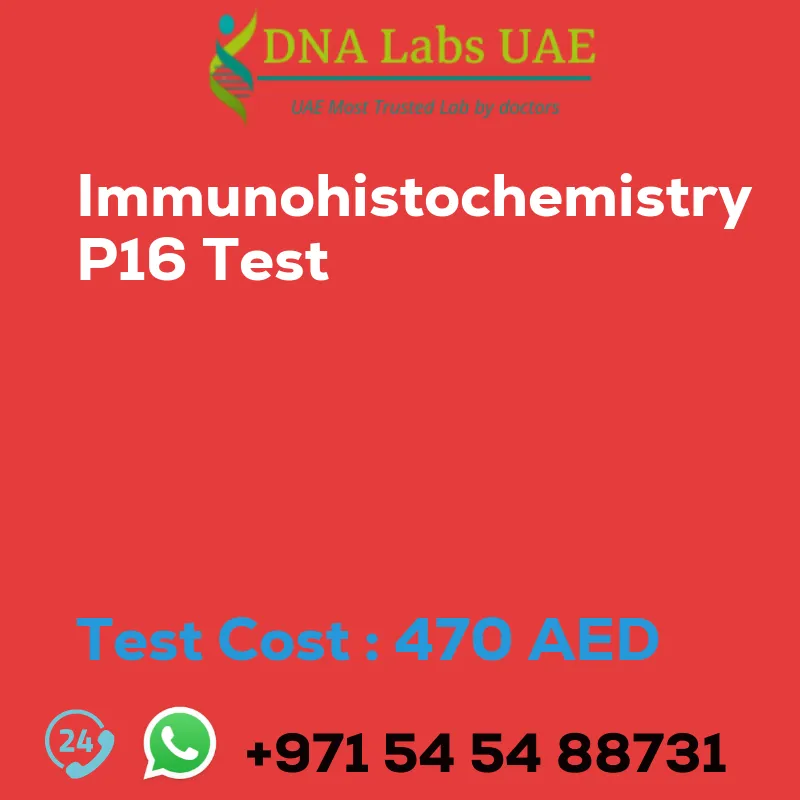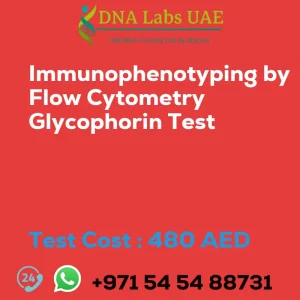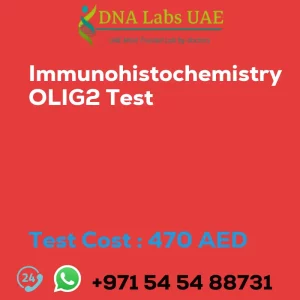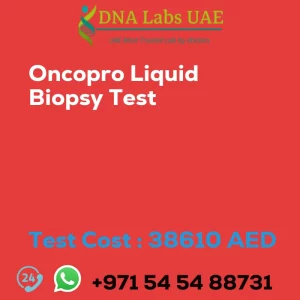IMMUNOHISTOCHEMISTRY P16 Test Cost AED: 470.0 Symptoms Diagnosis
Welcome to DNA Labs UAE, a leading genetic lab offering the IMMUNOHISTOCHEMISTRY P16 test for cancer diagnosis and research. In this blog, we will discuss the cost, symptoms, diagnosis, and other important details about the test.
Test Name: IMMUNOHISTOCHEMISTRY P16 Test
Components:
- Price: 470.0 AED
Sample Condition:
Submit tumor tissue in 10% Formal-saline OR Formalin fixed paraffin embedded block. Ship at room temperature. Provide a copy of the Histopathology report, Site of biopsy, and Clinical history.
Report Delivery:
Sample: Daily by 6 pm
Report Block: 5 days
Tissue Biopsy: 5 days
Tissue large complex: 7 days
Method:
Immunohistochemistry
Test Type:
Cancer
Doctor:
Oncologist, Pathologist
Test Department:
HISTOLOGY
Pre Test Information:
Provide a copy of the Histopathology report, Site of biopsy, and Clinical history.
Test Details:
The Immunohistochemistry (IHC) P16 test is a diagnostic test used to detect the presence of the P16 protein in tissue samples. P16 is a tumor suppressor protein that regulates the cell cycle and prevents uncontrolled cell growth.
The IHC P16 test involves the use of specific antibodies that bind to the P16 protein in tissue sections. These antibodies are tagged with a visible marker, usually an enzyme or a fluorescent dye. When the antibody binds to the P16 protein, it produces a color or fluorescence signal, indicating the presence of P16 in the tissue.
The IHC P16 test is commonly used in cancer diagnosis and research, particularly for detecting abnormal cell growth and determining the prognosis of certain types of cancers, such as cervical cancer and head and neck squamous cell carcinoma. High levels of P16 protein expression are often associated with cell cycle dysregulation and the development of cancer.
The results of the IHC P16 test are typically interpreted by pathologists who examine the stained tissue sections under a microscope. They assess the intensity and distribution of the staining to determine if P16 protein is present and to what extent. The results can help guide treatment decisions and provide valuable information about the behavior of the tumor.
It is important to note that the IHC P16 test is just one tool used in cancer diagnosis and management. It should be interpreted in conjunction with other clinical and pathological findings to make an accurate diagnosis and determine the appropriate treatment plan.
| Test Name | IMMUNOHISTOCHEMISTRY P16 Test |
|---|---|
| Components | |
| Price | 470.0 AED |
| Sample Condition | Submit tumor tissue in 10% Formal-saline OR Formalin fixed paraffin embedded block. Ship at room temperature. Provide a copy of the Histopathology report, Site of biopsy and Clinical history. |
| Report Delivery | Sample Daily by 6 pm; Report Block: 5 days Tissue Biopsy: 5 days Tissue large complex : 7 days |
| Method | Immunohistochemistry |
| Test type | Cancer |
| Doctor | Oncologist, Pathologist |
| Test Department: | HISTOLOGY |
| Pre Test Information | Provide a copy of the Histopathology report, Site of biopsy and Clinical history. |
| Test Details |
Immunohistochemistry (IHC) P16 test is a diagnostic test used to detect the presence of the P16 protein in tissue samples. P16 is a tumor suppressor protein that regulates the cell cycle and prevents uncontrolled cell growth. The IHC P16 test involves the use of specific antibodies that bind to the P16 protein in tissue sections. These antibodies are tagged with a visible marker, usually an enzyme or a fluorescent dye. When the antibody binds to the P16 protein, it produces a color or fluorescence signal, indicating the presence of P16 in the tissue. The IHC P16 test is commonly used in cancer diagnosis and research, particularly for detecting abnormal cell growth and determining the prognosis of certain types of cancers, such as cervical cancer and head and neck squamous cell carcinoma. High levels of P16 protein expression are often associated with cell cycle dysregulation and the development of cancer. The results of the IHC P16 test are typically interpreted by pathologists who examine the stained tissue sections under a microscope. They assess the intensity and distribution of the staining to determine if P16 protein is present and to what extent. The results can help guide treatment decisions and provide valuable information about the behavior of the tumor. It is important to note that the IHC P16 test is just one tool used in cancer diagnosis and management. It should be interpreted in conjunction with other clinical and pathological findings to make an accurate diagnosis and determine the appropriate treatment plan. |







